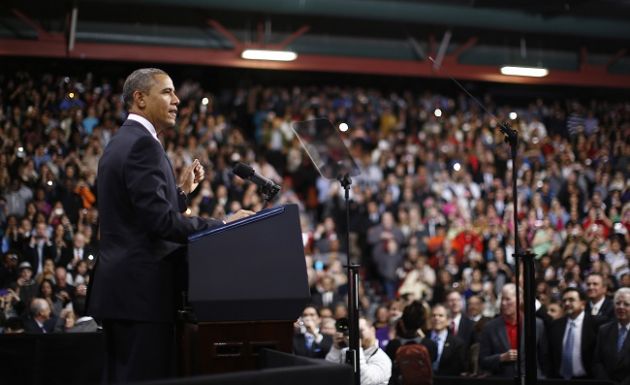Churches back Obama's calls on U.S. immigration reform

U.S. President Barack Obama has called on lawmakers to open a path to citizenship for 11 million people in the country illegally.
The effort was welcomed by national church and charity leaders who will seek to influence and expedite the legislative process in the coming months.
The move comes months after President Obama's re-election last year, where he enjoyed an overwhelming amount of support among Latino voters. Earlier this week a group of senators representing both major parties proposed a path to citizenship for undocumented immigrants already living in the U.S, a guest worker program and employment verification systems.
"I'm here because most Americans agree that it's time to fix a system that's been broken for way too long," President Obama said at a high school the western state of Nevada, where more than 80 percent of Latinos voted to re-elect him last year. "I'm here because business leaders, faith leaders, labor leaders, law enforcement, and leaders from both parties are coming together to say now is the time to find a better way to welcome the striving, hopeful immigrants who still see America as the land of opportunity. Now is the time to do this so we can strengthen our economy and strengthen our country's future."
Leaders of some U.S. denominations and charities applauded the president and lawmakers's proposals, emphasizing the role of faith groups in the process.
"The voice of the religious community is essential in this national debate. We call upon members of our churches to connect with local, state and national coalitions and initiatives engaged in supporting comprehensive immigration reform consistent with the measures advocated by the UCC and our interfaith and ecumenical partners," wrote the leaders of the United Church of Christ, a denomination with more than 1 million members.
The UCC leaders, known as the Collegium of Officers includes The Rev. Geoffrey A. Black, the Rev. M. Linda Jaramillo, the Rev J. Bennett Guess, the Rev. James Moos, and W. Mark Clark.
President Obama's commitment to the legislative process will be critical, according to United Methodist Church bishop Minerva Carcaño. The bishop, who is heads the denomination's Los Angeles Area has been a spokesperson for immigration reform for the Council of Bishops since 2006,
"United Methodists have long been active in working with other faith leaders from across the country in mobilizing thousands of people through hundreds of public-witness actions and meetings with members of Congress and their staffs," she told the United Methodist News Service. "Comprehensive immigration reform is a major concern for us."
Point of contention
The head of the UMC's social justice arm warned against making the pathway to citizenship contingent on increased border enforcement.
"We have spent billions on border security. We have deported more than a million people in the past several years, including 100,000 parents of U.S. citizen children. What more needs to be done?" said Jim Winkler, CEO of the church's General Board of Church & Society.
He noted that a top Obama domestic security official has previously testified that the border with Mexico is secure.
"It is long past time to get serious about creating a pathway to citizenship free of any further enforcement measures and to reunify families," he said. "That is the kind of reform that we need and that will move us forward as a nation."
Church World Service, a U.S.-based humanitarian agency, said it was eager to see detailed legislative language of the proposal.
The organization said in a statement on Tuesday that it was also opposed to making any part of the path to citizenship contingent upon border enforcement criteria and the implementation of a new visa tracking system, "which could take years, if not decades to complete and leave those seeking permanent legal status in limbo."
The organization also said it was "concerned about the inaccuracies of an electronic employment verification system and how it could impact the pathway to citizenship, as well as provisions that would restrict immigrants from accessing important services."
Erol Kekic, director of the CWS Immigration and Refugee Program said it would be active in addressing the issues with legislators and was "committed to seeing immigration reform enacted in 2013."